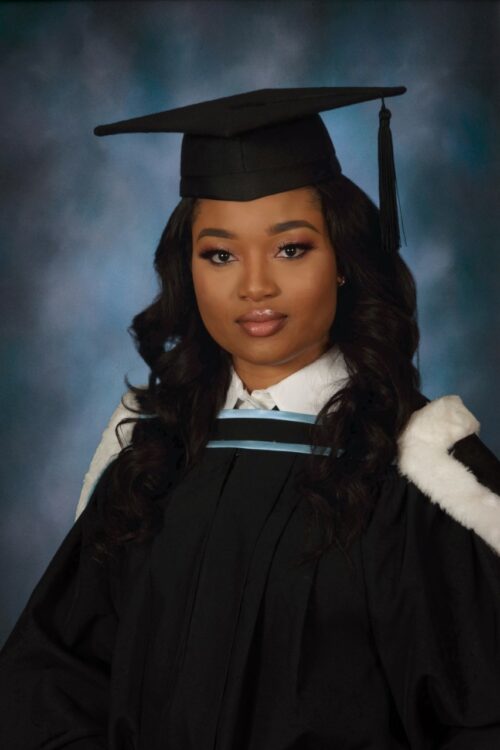Yesterday’s Black Grad event, featured a pair of valedictorians – outstanding students who have earned the respect of the peers who they represent through their strong academic performance, leadership and commitment to making the University – and the world – a better place.

“Iyanu is graduating with a double major in Political Science and African Studies in the Faculty of Arts. During her time here, she has been involved in a range of activities that have all contributed toward making systemic change both at McGill and in Canada at large,” said Heleena De Oliveira, in introducing Iyanu Soyege during Black Grad. “She is someone who is inspiring to me in every way and someone who I’ve come to rely on both and work and in friendship. I mean it from the bottom of my heart that I am so grateful to have gotten to know you.”
As part of the Reporter’s Spring 2021 Convocation coverage, we spoke with Soyege.
What is your hometown?
Despite having lived in Edmonton, Alberta for most of my life, my identity has been shaped by the different experiences I have been fortunate enough to have through living in various parts of the world. I am a Swati by birth, Nigerian by blood and Canadian by citizenship and residence.
Why did you choose McGill?
I struggled between choosing McGill and another exceptional university in Ontario. What made me choose McGill was the presence of an active African student’s organization on its campus the McGill African Students’ Society. I knew that entering a very rigorous academic environment would come with challenges and I desired to cultivate a university experience that would be multifaceted. I wanted to receive the opportunity to study at a university with a diverse range of programs that cater to my intellectual interests in addition to meeting people from similar and diverse backgrounds. I was confident that McGill would provide this, and it did!
What are some of the highlights of your time as a McGill student?
The Black History Month celebrations at McGill were phenomenal and this was made possible through the work of Shanice Nicole Yarde. Each year, as a Black student, I was reinvigorated by keynotes delivered by Black individuals who have trailblazed in their respective fields (e.g. literature, medicine, law). My highlights also include receiving the opportunity to discuss important issues with world leaders in spaces I would not have had access to had I not attended McGill as a student.
Three favourite places on McGill/Mac campus?
Leacock B31 was my favourite place on campus. Located in the basement of one of McGill’s busiest buildings, this room served as office space for the African Studies and International Development students’ organizations. Leacock B31 was where I made many great friends, had some of my best laughs, studied and napped between classes.
What were some of the biggest challenges you faced during your time here and how did you overcome them?
My first and final academic years at McGill stretched me immensely. I had minor health concerns exacerbated by not knowing when to take breaks with my academics and service work. When people say, “if you do not rest, you will be forced to,” I now know this to be true because I experienced this personally. I overcame these challenges by praying, receiving guidance from my professors, and reading books detailing the lives of Black women who have successfully navigated higher education institutions despite their respective challenges. The two books that have helped me the most are Eternity Martis’ They Said This Would Be Fun and Taking Up Space by Chelsea Kwakye and Ore Ogunbiyi.
Tell us about the 2021 Class of Black graduates
Black students at McGill display what empathy in community ought to look like. I am proud to be among individuals who exercise compassion and care for others in their daily lives. Being surrounded and supported by the Black McGill community has been integral to my success as a well-rounded student.
Who or what will you miss most?
The list of people I will miss is long, but to respect the space I have been given to share a few sentiments, I will keep it short! I am deeply grateful for the professors who have helped me at different points in my academic journey and in navigating life after graduation – Professors Daniel Douek, Nii Addy, Kelly Gordon and Debra Thomspon – I will miss them dearly. I will also miss the many friends I have made through my involvement with the Black Students’ Network, the African Studies Students’ Association, McGill Women in House and the friends I have made in random encounters around campus and the classroom.
What advice do you have for new students to McGill?
Developing a habit of introspection at an early point in your McGill career is crucial. At McGill, you will be given many opportunities when it comes to choosing associates and enriching yourself academically and professionally. When you are intentional about giving attention to your motivations and desires, you are better able to decide what is for you and what will not serve you. Cultivating internal reflection as a practice will prove to be very useful in the latter part of your degree. I would also like to suggest that you familiarize yourself with the students’ association for your program as soon as you can. Once I did this myself, I was able to notice an upward trend in my grades considering I made use of the available resources.
Do you have anything to add?
As a student, do not be afraid to be an initiator. Find gaps where they persist and address them by harnessing your skills and working with other students who are passionate about positively transforming the trajectory of people’s lives at McGill and beyond.
